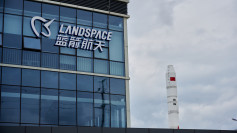Meta, formerly known as Facebook, saw its shares jump by over 6% on Thursday following the release of second-quarter earnings that surpassed Wall Street expectations and a promising revenue forecast. The tech giant reported a revenue increase of 22%, reaching $39.07 billion, up from $32 billion the previous year. This exceeded analysts' predictions of $38.31 billion, according to data from LSEG.
Net income for Meta also saw a substantial rise, soaring 73% to $13.47 billion, or $5.16 per share, compared to $7.79 billion, or $2.98 per share, in the same period last year. Analysts had anticipated earnings of $4.73 per share. For the third quarter, Meta projects revenue between $38.5 billion and $41 billion, with a midpoint of $39.75 billion, again topping the average analyst estimate of $39.1 billion.
CEO Mark Zuckerberg and CFO Susan Li attributed this growth to the company's significant investments in artificial intelligence (AI). "The ways that it's improving recommendations and helping people find better content, as well as making the advertising experiences more effective, I think there's a lot of upside there," Zuckerberg said during the earnings call. "Those are already products that are at scale. The AI work that we're doing is going to improve that."
Meta's substantial investment in AI has been praised by analysts. Baird noted that the company continues to benefit from "years of AI-related investments," while Bank of America described Meta as the top AI play in consumer internet. "Meta's capital expenditures are increasing because of AI infrastructure spend, but it is driving tangible business results," the analysts wrote.
However, the company's AI-driven growth comes with rising costs. Meta's capital expenditures for the year are now estimated to be between $37 billion and $40 billion, up from a previous low-end estimate of $35 billion. CFO Susan Li highlighted that infrastructure costs will significantly drive expense growth next year as the company recognizes depreciation and operating costs associated with its expanded infrastructure footprint.
Despite these rising costs, analysts remain optimistic about Meta's future. Barclays analysts noted that Meta is executing at "arguably the best pace of any company in digital advertising." They added, "The investment community is giving META and all the hyperscalers a pass on what looks to us like an AI capex overbuild, but it's going to bring in a bunch of new and exciting products that aren't baked into revenue forecasts."
In addition to its strong performance in advertising, Meta's Family of Apps, which includes Facebook, Instagram, WhatsApp, and Messenger, generated $38.72 billion in revenue, exceeding the expected $37.7 billion. This segment's revenue was $31.7 billion in the same quarter last year.
Meta's Reality Labs segment, which focuses on mixed reality hardware and software, reported a revenue of $353 million, slightly below expectations of $376 million. The segment, however, continues to face financial challenges, with a reported loss of $4.49 billion in Q2, slightly better than the anticipated $4.53 billion loss.
Despite these challenges, the company remains committed to advancing its AI capabilities. Last week, Zuckerberg introduced Meta's latest open-source large language model, Llama 3.1, emphasizing the company's focus on open-source AI as opposed to closed-source models like OpenAI's ChatGPT. Forrester research director Mike Proulx commented, "Meta is well positioned to drive value with [generative AI] for advertisers, but let's be clear that it's a ways off, if ever, before CMOs will simply hand over the keys to an AI agent that will autonomously generate ad creative on their behalf."
Meta's strong Q2 performance and optimistic outlook are tempered by ongoing legal challenges. Recently, Texas Attorney General Ken Paxton announced a $1.4 billion settlement with Meta over the alleged misuse of Texans' biometric data for its Tag Suggestions feature.





